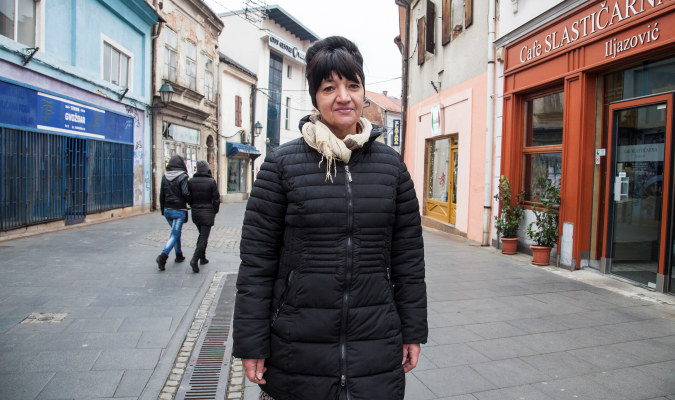In the words of Mirsada Terzic: “One day something clicked and I felt like I needed to talk”
Date:

A survivor of wartime sexual violence, Mirsada Terzic was displaced from her home town Brcko, close to the Croatian border, after the 1992-1995 war in Bosnia and Herzegovina. A divorced single mother of two, Terzic is one of the founders of Naš glas (Our Voice), an association for women survivors of wartime sexual violence in Bosnia and Herzegovina. The association aims to empower women, mentally and economically, through occupational work therapy. Naš glas has benefited from UN Women support for workshops in computer literacy, sewing, knitting and handicrafts making. The handicrafts produced by the survivors bring them income at local markets. Terzic is a vocal advocate of the rights of wartime sexual violence survivors and speaks publicly about the issue.
It took some time for me come out of my silence about my own trauma. I felt tortured by the pictures in my head. At first, I stayed quiet. I did not want to talk to anyone, but these pictures were with me every night and day. One day something clicked and I felt like I needed to talk. A female doctor in Tuzla helped me. She literally picked me up from the ground. It was much easier for me when I started speaking about my experience.
Then we came up with the idea to start an association. We wanted to be active and useful in society, and find a way to escape from our own thoughts and the pictures in our minds. We also wanted a safe place, where we could work, feel productive and talk to each other about what happened. It’s our way to recovery.
There is a lack of relevant legislation for conflict related sexual violence (CRSV) survivors in Bosnia and Herzegovina. In addition, we face social stigma. I know of a survivor who was held captive for 3.5 years during the war. She was raped repeatedly and gave birth to two children while in captivity. When she escaped and returned to Tuzla, she no longer had a home and was put on a long waiting list for people affected by war traumas. Yet, another woman who suffered no war traumas and was supported by her children abroad, received a home. She had paid a bribe. When the other woman went to local authorities to file a complaint, they told her, ‘Who do you think you are to complain?’ Because of this stigma, she felt helpless, like she had nowhere to go.
As CRSV survivors, we also don’t get priority treatment when it comes to health care. We are put on long waiting lists for the specific care that we need like neuropsychiatric appointments, PAP tests and cardiovascular check-ups. Our needs are not recognized. Tuzla has only three psychiatrists specializing in post-traumatic stress disorder (PTSD) therapy. PTSD is a big issue for us. The shortage of doctors makes it very difficult for women to recover from their trauma.
The silence on CRSV issues brought injustice upon those who experienced it. This injustice made me step up and speak publicly about this social taboo and become a human rights advocate, especially for the women survivors of sexual violence during war. With support from UN agencies, and primarily IOM, we, the members of Naš glas, organize national workshops to advocate for better health care legislation and other rights for the CRSV survivors. We are not hiding anymore, we are proud!”